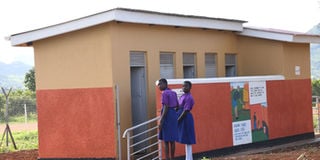Menstrual challenges keep Karamoja girls out of school

Awach Primary School girls at one of the pit latrine facility put up by Absa Bank in Abim district. PHOTO | SIMON PETER EMWAMU
What you need to know:
- In Karamoja sub region, hundreds are left to fend for the little siblings in their communal settlements, others work in mines as baby babysitters, while the others fail to carry on with their primary studies as result often perpetuated by the inability of parents to buy sanitary pads.
Whereas other regions continue to register strides in the numbers of girl children completing primary education, in Karamoja sub region, a number of girls faced with menstrual hygiene challenges continue to drop out of school.
In Karamoja sub region, hundreds are left to fend for the little siblings in their communal settlements, others work in mines as baby babysitters, while the others fail to carry on with their primary studies as result often perpetuated by the inability of parents to buy sanitary pads.
Also, raditionally, the girl child remains not only a major source of labour at the homestead level but equally prized as a source of bride wealth.
According to Mr Charles Dickens Owinyi, the district education officer of Abim, at least 86 percent of girl children in the entire sub region of Karamoja don’t finish primary section with the majority dropping out before even reaching primary four.
“It is a complex matter that has been even made worse by the menstrual hygiene related challenges,” the Abim DEO serenaded.
To ease the problem, Mr Owiny said there is need for development partners to have a whole round intervention. This, he says, starts from empowering the parents to appreciate the importance of education, but also have incentives that will financially empower the parents to fend for the girl children while they are at school to be able to have sanitary pads when they undergo menstruation.
At the school level, Mr Owiny states that there is need to have sanitary facilities which are tailored at easing the life of girls during their menstrual periods while at school.
The senior woman teacher of Awach Primary School, Awach Sub-county, Abim District, Ms Esther Acheng, the school has only seen some ray of hope following the intervention of Absa Bank , in partnership with World Vision.
In their bid to keep the girl child at school, the two partners constructed changing rooms, provided water facility and pit latrine, all geared at keeping the girl child at school during their menstrual cycle days.
“For the last 50 years the school has been in existence, we have not had a water facility. This complicated menstrual hygiene among the girls,” she explained.
Mr Mumba Kalifungwa, Absa Uganda Managing Director said said an offer of Shs90M towards the construction of the facility came from the 2023 run proceeds.
“We believe that education is a right that every child should have access to,” he said at the handover of the facilities last week.
According to Ms Agnes Catherine Akello, a parent at Orwamuge PS, the issue of menstrual hygiene in the entire Karamoja region remains a big challenge, adding that at the community level, some women still use goat skins as safeguards during their period.
“A lot has been invested in this region in the last three to five decades by both government and development partners but the poverty levels among the inhabitants remains worrying that we can’t afford sanitary pads,” Ms Akello bemoaned.
Going forward, she said that there is need to re-evaluate the intervention that have been destined for Karamoja in the last five decades and figure out as to why poverty has remained a constant, adding that at the very basic, government should have a sanitary pad making facility built in Karamoja with purposing of supplying free sanitary pads to both school going children and their parents.
“In this era we should not be having children miss classes because they cannot have access to pads,” she emphasized.
Ms Bernadette Ojao, chief executive officer at Wabibi pads limited based in Moroto district, out of every 10 school going children who are girls in Karamoja sub region, seven children always stay out of school during their period.
Mr Paul Lokol, the Nabilatuk district chairperson said that the worsening performance among the children in the primary leaving examinations can partly be tagged to the challenges girl children undergo during their stay at school.




